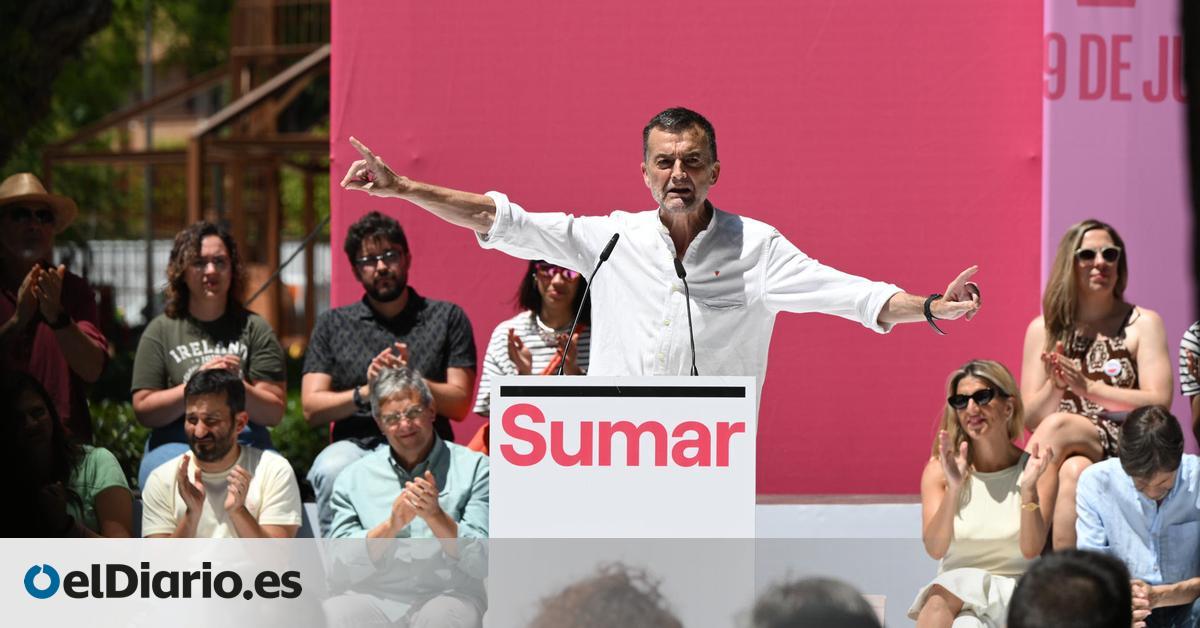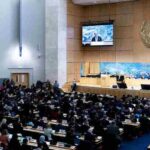
Yolanda Díaz announced her resignation as leader of Sumar this Monday, a few minutes after three in the afternoon. At that time, the leaders of Izquierda Unida were preparing for their first meeting after the federal assembly in May, in which they planned to address the situation after the results of the European elections. If the decision of the second vice president of the Government took them by surprise, a few hours later its general coordinator, Antonio Maíllo, was already defending in the microphones of Cadena Ser a roadmap for the new time in the transformative left.
“Sumar is surpassed as a unifying project,” he said, using a conciliatory tone of voice but a content that challenges much of the work of Yolanda Díaz and her team during recent months to lead the confederal left. “The objectives we had have not been achieved, not even close,” she criticized after lamenting that in just ten years the political space as a whole has fallen from 18% to 8% of the votes.
Maíllo presented in Hora 25 his theses on the path that the confederal space should follow after the departure of Yolanda Díaz: “We are entering a new stage in which the organizations will have the leading role.” In summary, the IU leader proposes that it is now the political parties, his from a state position and the comuns or Más Madrid from their territories, that must promote a coalition that may or may not be called Sumar but in which Movimiento Sumar , the formation of Yolanda Díaz, should be another political force.
Maíllo’s words came just hours after that announcement and before the rest of the parties that are part of Sumar, not even the Sumar Movement itself, had practically had time to carefully analyze not only the consequences of Díaz’s resignation, also the situation in which the entire political space and the coalition remains after Sunday’s results.
The debate in Izquierda Unida this Monday took place in a long meeting of more than five hours in which the organization established that the stage that had taken place until now has concluded. There will be no Sumar management with 30% reserved for the parties nor shared structures, the model that had been designed from the founding assembly of the project last March and that after the results of the European elections and the resignation of Yolanda Díaz , they understand in the organization, is no longer valid.
Between Monday and Tuesday, the different parties that are part of either the parliamentary coalition or the organic process that Sumar had initiated, have also held management meetings to analyze the stage that is opening. Most of these forces agree on the diagnosis that the time of Yolanda Díaz’s platform as a hegemonic subject in the coalition has ended and that a space is necessary in which political forces can agree on a much more horizontal relationship. .
Más Madrid shared a document this Tuesday with the militancy in which it called on the rest of the parties to convene what they called a “Coalition Table”, that is, a meeting in which all the parties that are part of it are present. of the parliamentary alliance.
“Bilateral relations between political formations will continue to be necessary, but it is time to think and act together. For this reason, from Más Madrid we call for the convening of a Coalition Table: the space in which political movements and organizations sit down to debate and define from autonomy and horizontality the meaning and direction of our cooperation and collaboration.” , moved the training.
In a statement published this Monday, Verdes Equo boasted of having put “the project above interests” in these European elections, despite “not having a starting position and not being able to participate in the main strategic decisions of the campaign”, whose results, they conclude, have not been as expected.
Given these poor results, Verdes Equo “has decided to begin a process of reflection on its role in Sumar and the future of the green political space in Spain, which will culminate in its Federal Assembly in October. In the party’s opinion, it is essential to change course to reinforce the ecosocial political project in Spain,” they said in a statement.
A similar idea has been conveyed by the Andalusian People’s Initiative, which in a statement recognizes that Yolanda Díaz’s decision “is generous and responsible” and hopes that the “renewed organization of Sumar” will be “an adequate space” to advance at the federal level. and plurinational and “to organize the response that the Andalusian left will have to give in the coming times.”
Sumar opens a dialogue process with the parties
In Movimiento Sumar, meanwhile, they have agreed to open a dialogue process with the parties to reorient and reinforce the political project in the face of the departure of Yolanda Díaz. In the formation they recognize that these conversations are going to be slow and deliberate, far from the rhythms of press conferences, as Íñigo Errejón, the spokesperson for the coalition in Congress, acknowledged this Tuesday.
“The time that opens is a time in which conversations are going to take place at a different pace. From the awareness of everything achieved by making our way together and the awareness that this is the direction to continue pushing the government,” he said, asked about the stage that opens after Díaz’s resignation as general coordinator of Sumar.
At a press conference in Congress, journalists also asked him about the end of Sumar’s era as a unifying movement that Maíllo predicted. Errejón asked that in this new moment “conversations and dialogues” be done “in a fraternal manner.” “And that sometimes is not with microphones in front of them,” he said. “We are going to continue making our way together. This force will continue, that is what they voted us for,” he defended.
Sumar will hold a first management meeting this Tuesday to define the next steps, but the organization maintains that no major decisions are yet expected from that meeting and insist that the process will still be long. It is not about replacing any leadership because, they maintain, Yolanda Díaz will continue to lead from the Government and the parliamentary group in which all parties are represented. “Yolanda is our best political and electoral asset,” Errejón responded this Tuesday to the question of whether the minister could repeat as a candidate in hypothetical general elections.
From Geneva, where she has participated in the International Labor Confederation, the vice president assured in statements to the press that she is not leaving. “When there are bad electoral results, we must assume responsibilities. I’m not leaving, I’m staying within Sumar and now Sumar is going to give a calm debate that starts on Thursday. We do this to win in the general election,” she said.
The questions that arise now revolve around the way in which the confederal space is going to combine Díaz’s leadership within the Government, his decisions on the orientation of policies, strategy or clashes with the Socialist Party, with that will of the parties to have much greater weight in the new configuration of the coalition.
Both Izquierda Unida and Más Madrid have already made their diagnosis of the failed strategies that have led to this point and in Maíllo’s party they believe that if Sumar’s theses sought to unite the left and widen the space, the tools have to be different now. This will no longer be, they predict, a space where one party tells the rest what they have to do. If Yolanda Díaz can repeat as a candidate in a general election, they reflect, it will be good news because the Government will have functioned well and will have the capacity to win primaries open to all political party militancy.
Source: www.eldiario.es

